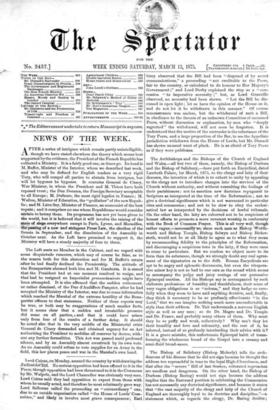The Archbishops and the Bishops of the Church of England
and Wales,—all but two of them, namely, the Bishop of Durham and the Bishop of Salisbury,—have put forth an Encyclical, dated Lambeth Palace, 1st March, 1875, to the clergy and laity of their dioceses, the intention of which is to exhort to unity by appealing to the clergy not to introduce changes into the services of the Church without authority, and without consulting the feelings of their parishioners ; not to sanction new doctrines repugnant to Scripture as interpreted at the time of the Reformation.; .not• to give a doctrinal significance which is not warranted to particular rites and ceremonies ; and not to be slow to obey the ecclesi- astical law as interpreted by the decisions of lawful tribunals. On the other hand, the laity are exhorted not to be suspicions of honest efforts to promote a more reverent worship in conformity with the Book of Common Prayer. This is all very well, though rather vague,—necessarily so, since such men as Bishop WOMB- worth and Bishop Temple, Bishop Selwyn and Bishop Bicker- steth, would not be at all likely to agree as to what they mean by recommending fidelity to the principles of the Reformation, and discouraging a suspicious tone in the laity, if they were once to come to particulars. But we confess we object more to its form than its substance, though we strongly doubt any real agree- ment of the signataries as to the drift. Roman Encyclicals are apt to be angry and splenetic documents, but even the vitupera- tive minor key is not so bad to our ears as the sound which seems to accompany the pulpy and juicy oozings of our persuasive Episcopal unction. All the Bishops say is accompanied by such elaborate professions of humility and thankfulness, their sense of very vague obligations is so "solemn," and they hedge so care- fully when they seem to have said anything decisive, and, finally, they think it necessary to be so profusely affectionate "in the Lord," that we can imagine nothing much more uncomfortable in style than their address. Dr. Tait understands a nervous English style as well as any man ; so do Dr. Magee and Dr. Temple and Dr. Fraser, and probably many others of them. Why must they be so puffy and weak, collectively? Why can't they let their humility and love and solemnity, and the rest of it, be inferred, instead of so profusely interlarding their advice with it? It is a grave mistake, this unfortunate Episcopal habit of trans- forming the wholesome bread of the Gospel into a creamy and semi-fluid bread-sauce.


































